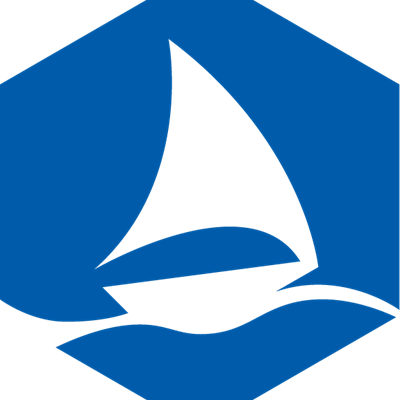Graphene Week 2023 kicks off: The Graphene Flagship turns wonder into action
Graphene Flagship announces 30 percent ROI at conference
The European Union (EU) commissioned scientific research initiative, the Graphene Flagship, began the 18th edition of Graphene Week on 4 September in Gothenburg, Sweden. This year’s event celebrated 10 years of successful research on graphene and 2D materials, announced the highly anticipated economic impact of the project and outlined the project’s future in Horizon Europe.
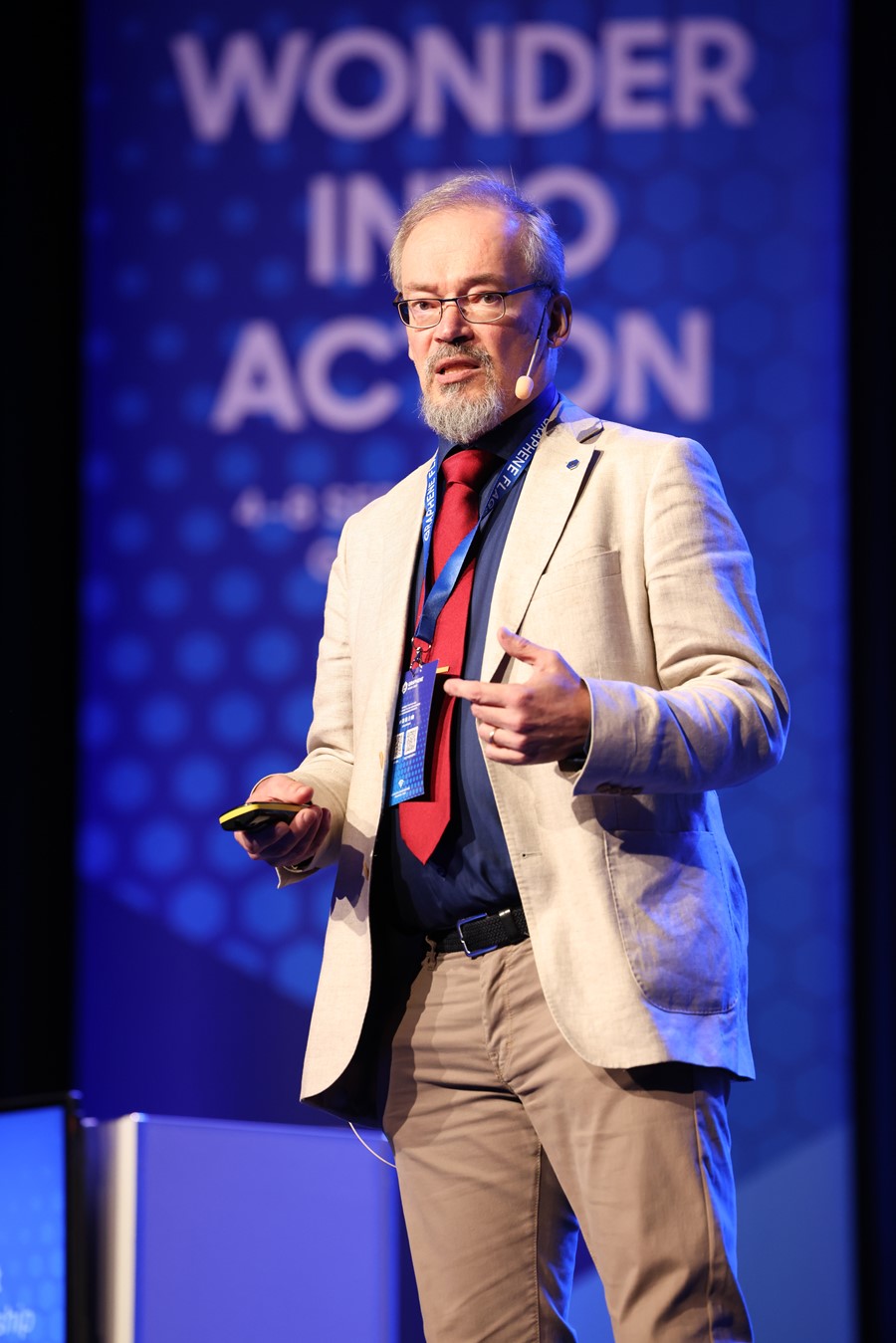
Jari Kinaret, Director of the Graphene Flagship.
In an opening press conference, Jari Kinaret, Graphene Flagship director presented the findings of a comprehensive economic impact report, developed independently by the WifOR Institute. The impressive results include the creation of 38,400 new jobs in the EU27 by 2030, plus an additional 2.15 jobs outside of the EU for every job in the region.
The results reinforce the benefits of the substantial investment in the Graphene Flagship by the European Commission. The project was, and continues to be, part of the EU’s largest ever scientific research initiative, having been launched with a €1 billion budget in 2013. Now in its tenth year, the project is excited to demonstrate the results of this investment — both in the realm of materials science and wider society.
Kinaret shared that the overall economic impact of the Graphene Flagship as calculated by the WifOR Institute will be approximately €3,800 million in the EU27 and about €5,900 million globally by 2030. The full report is available to view online.
“There are various ways of measuring impact, firstly, the impact measure can really only be done after the project has ended but there are some things we can measure,” said Jari Kinaret, director of the Graphene Flagship. “One year ago, we had 83 patents, we now have well over 5000 publications with almost 300.000 citations, we have around 100 products on the market, and we have launched 18 spin-off companies. These have so far attracted €140 million in private funding, measuring about a 30 percent ROI on the European commission’s investment of €400 million.”
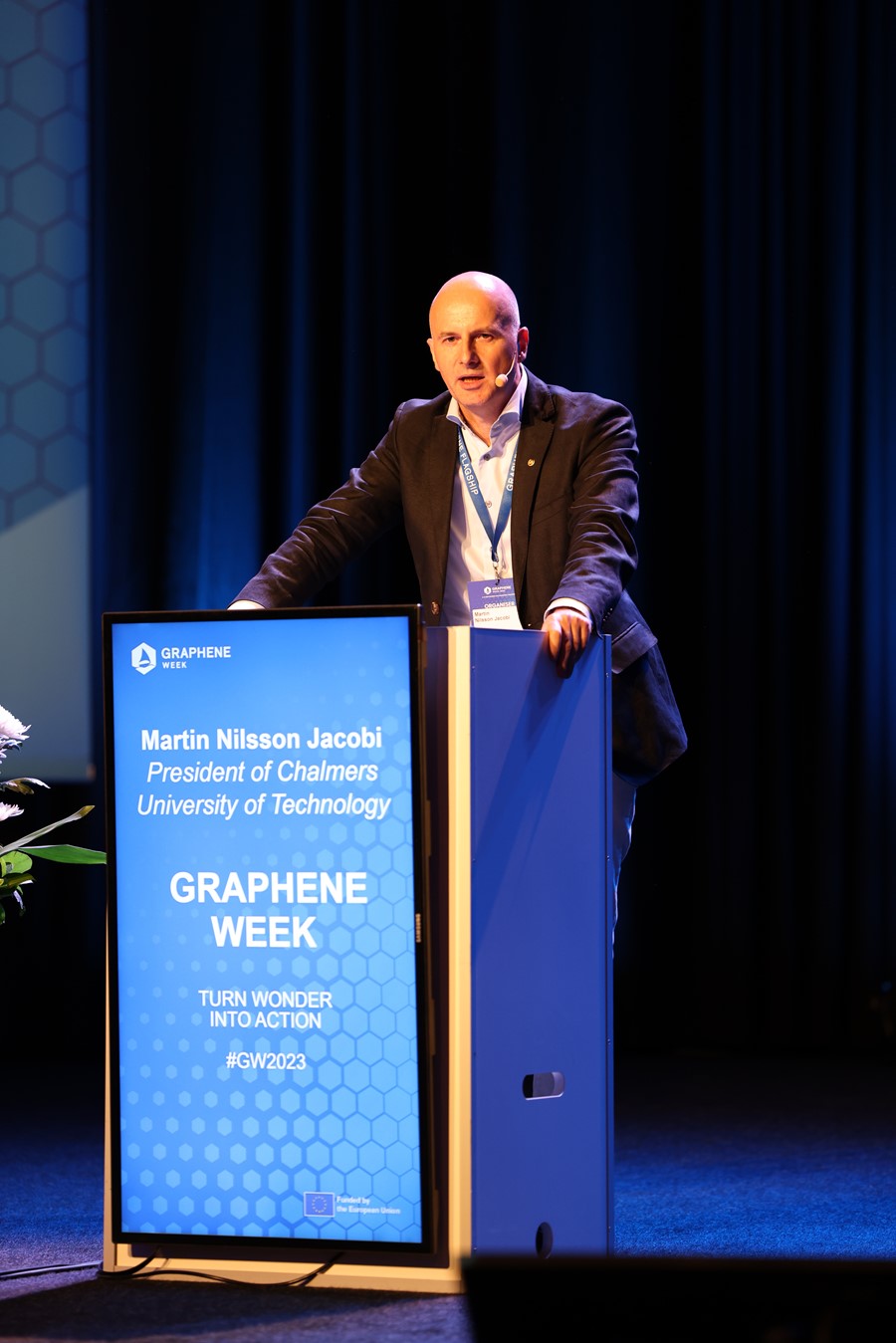
Martin Nilsson Jacobi, President of Chalmers University of Technology, Gothenburg, Sweden.
At the opening ceremony visitors were welcomed by Martin Nilsson Jacobi, President of Chalmers University of Technology, an institution that has coordinated the Graphene Flagship since its inception, Anna Andersson from ABB, Gustav Kalbe, Acting Director of Directorate C, DG CNECT, European Commission and more.
On the first day of Graphene Week the open pavilion gave attendees an opportunity to see some tangible outcomes of the Graphene Flagship, with products both at commercial and prototype stage. The project’s partnership with Italian automotive manufacturer Dallara Automobili Spa was on show, exhibiting a graphene-enhanced sports car that is currently going through testing. The pavilion also showcases the Flagship’s spearhead projects, including G+BOARD, Circuitbreakers and GICE.
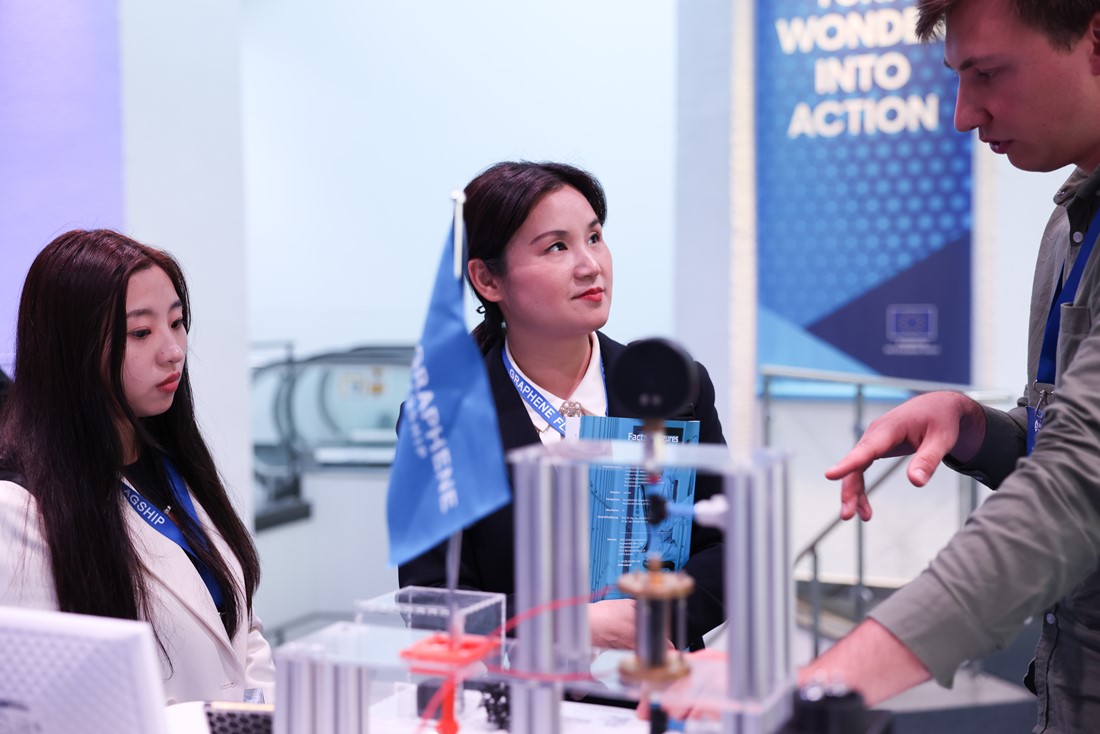
GW2023 Pavilion
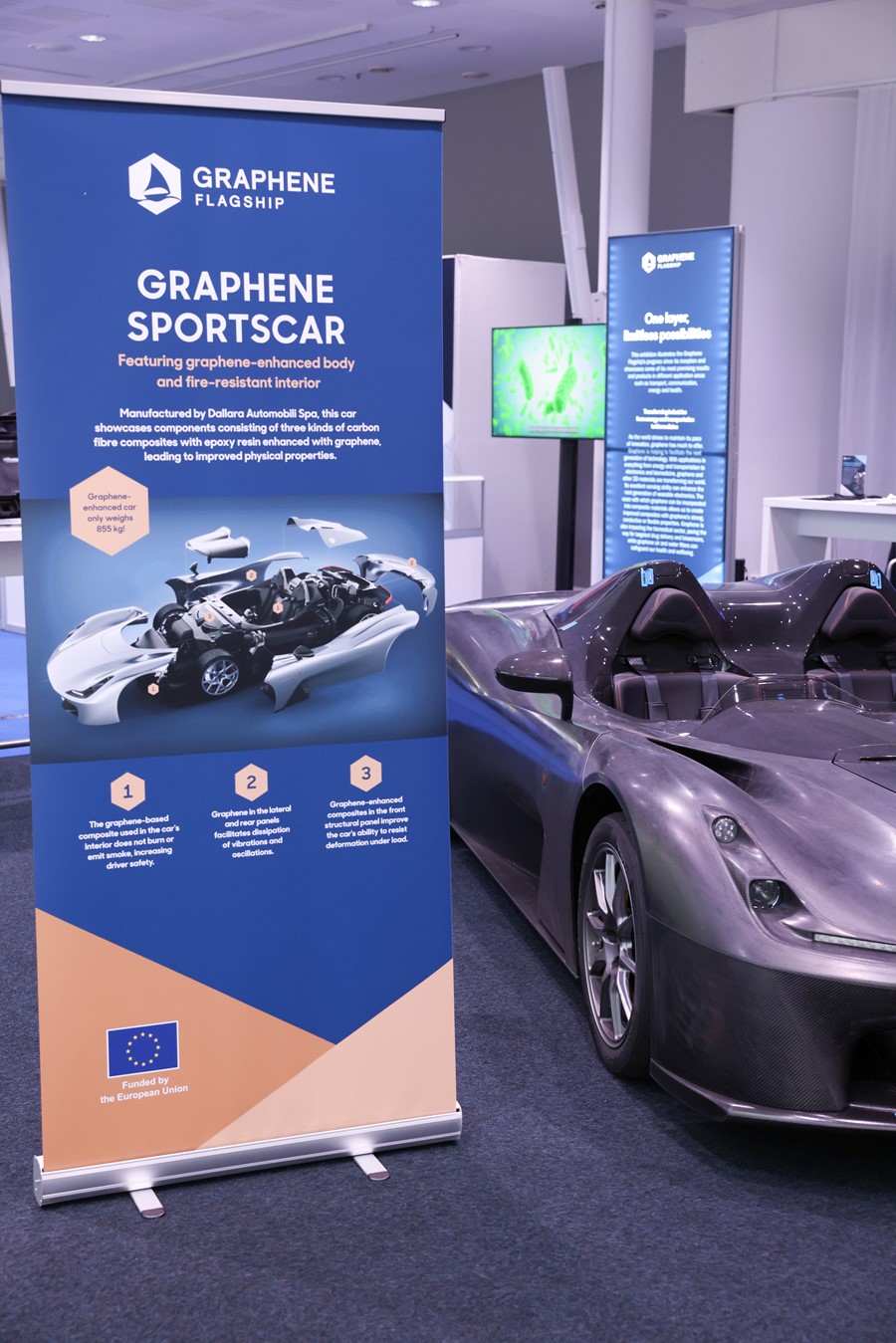
Dallara graphene enhanced sportscar on display in the Graphene Week 2023 Pavilion.
Additional graphene demonstrations include a point-of-use water filter with hollow graphene fibres for filtering emerging contaminants, a graphene composite pipe with integrated sensors for detecting fires and ruptures and cost-effective, highly efficient perovskite solar cells enhanced with graphene, surpassing current state of the art solar panel technology.
An important part of the first day was the Horizon Europe session, a continuing European funding project that the Flagship will be part of for the next three years. The session provided valuable insight into the future of 2D material innovation and research in Europe. The aim is to keep Europe at the forefront of graphene research and boost industry competitiveness and growth for the benefit of the European economy.
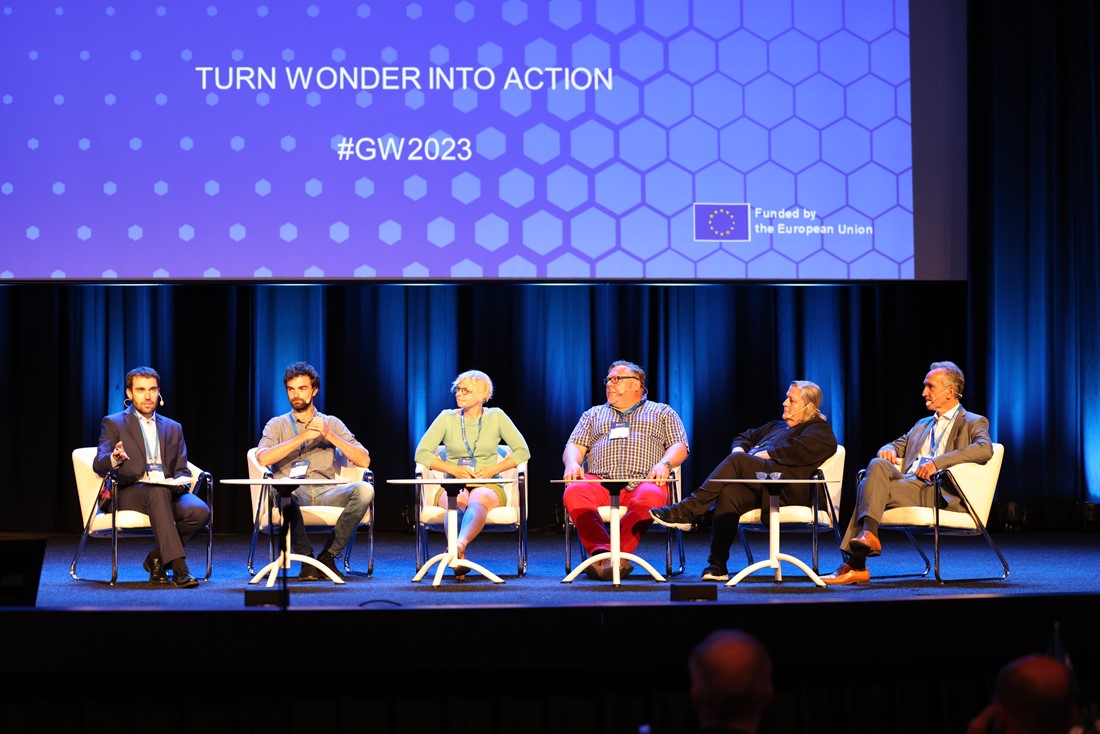
Horizon Europe panel, Kari Hjelt, third from the right.
Despite the positive outlook, the Graphene Flagship is not without its criticism. During an Open Forum event, panellists discussed the successes of the Graphene Flagship and the challenges of bringing a new material to market in such a short time frame.
“Graphene was discovered just 20 years ago,” explained Kari Hjelt, head of innovation at the Graphene Flagship. “When we compare the progress of graphene to other materials, like silicon, the progress has been incredibly impressive.”
Hjelt continued to explain the growth and strength of the connections of the Graphene Flagship to industry. The total percentage of the Graphene Flagship’s industrial partners has been increasing rapidly, with 50 percent of all partners now industrial companies. ABB, Nokia, Dallara, Airbus and BMW are just a few notable names. These partnerships and associated Spearhead Projects will be explained in more depth during the week’s conference.
Graphene Week comprises more than 200 lectures and sessions covering various aspects of graphene, including its fundamentals, applications and production methods. There were also over 200 poster submissions from emerging researchers and students, with four awards announced at the conference dinner: Bing Zhao of Chalmers University of Technology, Jill Serron of imec, Viney Ghia of Chalmers University of Technology and Varun Varma Pusapati of ICFO. This event marks a decade of dedication to advancing 2D materials innovation and commercialisation while also highlighting the continuation of the Graphene Flagship.
Graphene Week 2024 will be held in Prague, Czech Republic in October of 2024. Stay tuned!

More information on Graphene Week and access to the full program can be found on the Graphene Flagship website.




